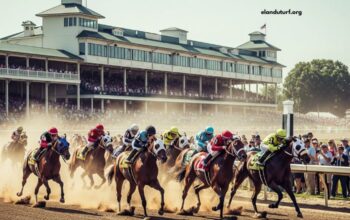Horse racing is not just about cheering for your favorite horse but also about making educated decisions based on various factors. The thrill of watching horses race is only amplified by the strategic challenge of placing successful bets. Horse racing betting combines elements of skill, research, and intuition.
The Concept of Les 5 Pions Turf
“Les 5 Pions Turf” translates to “The 5 Turf Tips” and represents a set of five fundamental strategies for improving your betting success. Each tip focuses on a different aspect of horse racing, providing a well-rounded approach to making informed bets.
Understanding the Basics
The “5 Pions Turf” are essentially five key strategies that every bettor should be familiar with. These tips cover the basics of form analysis, the importance of jockeys and trainers, the effects of track conditions, effective betting strategies, and the role of research and statistics. Mastering these tips can give you a significant edge over the competition.
Why These Tips Matter
These tips are designed to help you make better betting decisions. By understanding these aspects of horse racing, you can approach each race with a strategic mindset rather than relying on luck alone.
Tip 1: Analyze Form Guides
What is a Form Guide?
A form guide is a detailed record of a horse’s past performances. It includes information about the horse’s previous races, such as finishing positions, times, and the quality of the opposition. Form guides are essential tools for assessing a horse’s current form and predicting future performance.
How to Interpret a Form Guide
To interpret a form guide, you need to look beyond the simple win/loss record. Consider the following elements:
- Recent Form: Check the horse’s last few races to see if it has been performing well.
- Class of Races: Determine if the horse has been competing in races of a similar class to the current one.
- Race Distance and Conditions: See how the horse performs under various distances and track conditions.
Key Factors to Look For
When analyzing a form guide, focus on:
- Recent Wins: Horses that have won recently are often in good form.
- Consistent Placings: A horse that consistently finishes in the top positions is a good candidate.
- Speed Ratings: These indicate how fast a horse has run compared to other horses in past races.
Tip 2: Study the Jockey and Trainer
The Role of the Jockey
The jockey is a crucial part of a horse’s performance. A skilled jockey can make a significant difference in a race, using their experience and strategy to guide the horse to victory.
The Importance of the Trainer
The trainer is responsible for the horse’s overall condition and preparation for races. A successful trainer will have a track record of developing winning horses and preparing them for competitive events.
How to Evaluate Jockeys and Trainers
Evaluate jockeys by looking at their past performance, including win percentages and recent successes. For trainers, consider their history of producing successful horses and their overall success rate in races.
Tip 3: Track Conditions and Weather
The Impact of Track Conditions
Track conditions can greatly influence the outcome of a race. Different horses perform better under different conditions, such as firm or soft ground.
How Weather Influences Race Outcomes
Weather conditions can change the state of the track, affecting horse performance. Rain, for example, can lead to a softer track which might benefit horses that perform better under such conditions.
Adjusting Your Bets Based on Conditions
Stay updated on weather forecasts and track conditions. Adjust your bets according to how well horses perform under the current conditions.
Tip 4: Betting Strategies and Bankroll Management
Different Types of Bets
Understanding different types of bets can help you diversify your strategy. Common bet types include:
- Win Bet: Betting on a horse to win the race.
- Place Bet: Betting on a horse to finish in the top two or three positions.
- Each-Way Bet: A combination of win and place bets.
Effective Betting Strategies
Develop strategies like focusing on value bets rather than just picking favorites. Look for bets where you believe the odds are in your favor.
Managing Your Bankroll
Effective bankroll management is crucial for long-term success. Set a budget for your betting activities and stick to it. Avoid chasing losses and bet only what you can afford to lose.
Tip 5: Research and Statistics
The Importance of Research
Thorough research is key to making informed betting decisions. This includes studying form guides, analyzing past performances, and staying updated on racing news.
Finding Reliable Sources
Use reputable sources for your research, such as racing newspapers, official racing websites, and expert analysis from seasoned punters.
Using Statistics to Your Advantage
Statistics can provide insights into trends and patterns. Analyze historical data to identify successful strategies and make better predictions.
Conclusion
By applying these five tips, you can approach horse racing betting with a strategic mindset rather than relying solely on chance. Remember, while these tips can enhance your chances of success, there is no guaranteed way to win every bet. However, informed betting is the best way to improve your odds and enjoy the excitement of horse racing.







